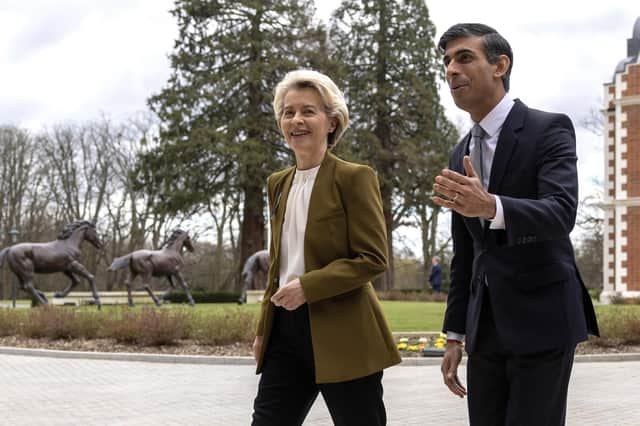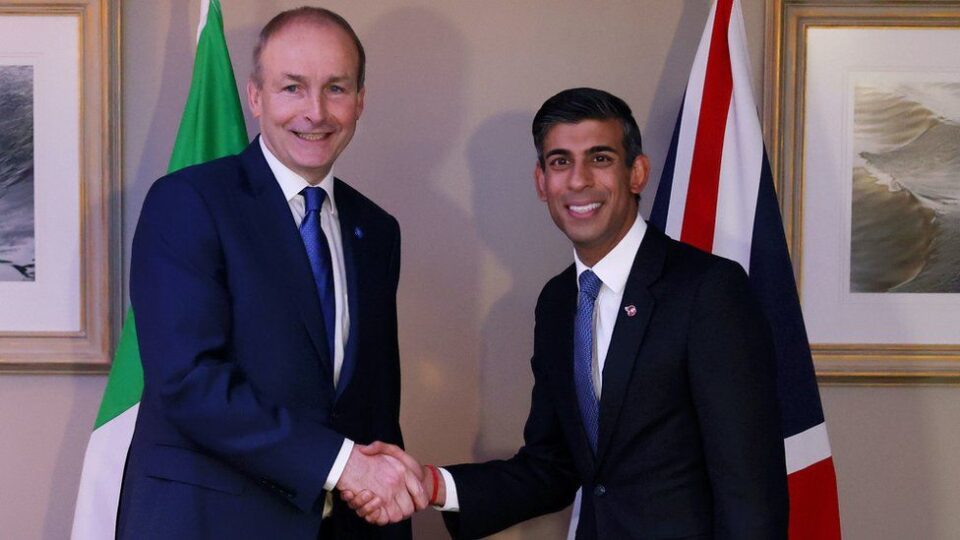Rishi Sunak applauds the new NI Brexit agreement, but DUP worries persist.
The agreement reached by Prime Minister Rishi Sunak over trade rules for Northern Ireland after Brexit has been hailed as a “decisive breakthrough.”
The accord received support from a sizable number of Tory MPs, including some who favored Brexit.
And the DUP, whose backing is crucial to reestablishing power-sharing in Northern Ireland, claimed that “substantial progress” had been made.
Yet, the party issued a warning that “major problems of concern” continue.
Sir Jeffrey Donaldson, the head of the DUP, said his party would now review the legal wording before deciding whether to endorse the agreement.

While some Tory MPs have stated they will only accept an agreement if it gets the support of the DUP, the party has boycotted the devolved government until its issues with the Northern Ireland Protocol are overcome.
Although it said it needed to go into the details, Sinn Féin, the largest party in the Northern Ireland Assembly, welcomed the agreement.
The DUP should return to devolved government, said the party’s vice-president Michelle O’Neill. She added: “We always said that with pragmatism, solutions could be found.”
A possible transaction had been under discussion for months, and it was ultimately revealed during a day of meticulously planned festivities.
By 14:00 GMT, reports that a solution had been reached on a problem that had troubled four prime ministers started to circulate within the government.
The breakthrough was soon after announced by the Premier and European Commission President Ursula von der Leyen during a press conference in Windsor.
The EU leader addressed the prime minister as “dear Rishi” and praised a “new chapter” of a “stronger EU-UK relationship” as they discussed their agreement on Monday. There was a noticeable affection between the two parties.
She then met King Charles for tea at Windsor Castle. Although they were seen grinning and conversing, several Lawmakers were worried that the encounter may involve the king in a divisive political matter.
The terms of the long-awaited deal were being positively received by several MPs who would have been anticipated to give the PM political headaches as Mr. Sunak made his way back to London to address the Commons.
Steve Baker, minister for the Northern Ireland Office and ardent Brexiteer, claimed Mr. Sunak had “done a blinder.”
He admitted that he had considered leaving “as recently as yesterday,” but added that the accord “should be sufficient for any rational unionists.”
Former Prime Minister Theresa May pushed lawmakers to support the agreement during a Commons debate, but Liz Truss and Boris Johnson were absent.
The US’s reaction will delight Number 10, as unresolved issues over the conditions in Northern Ireland have been viewed as a barrier to future trade negotiations between London and Washington.
“A crucial step to ensure that the hard-won peace and development of the Belfast/Good Friday Agreement is sustained and strengthened,” US Vice President Joe Biden said of the agreement.
The Northern Ireland Protocol, which Mr. Johnson signed and which entered into effect in 2021, is modified by the accord, known as the Windsor Framework.

By performing checks between Northern Ireland and Great Britain in place of the Irish land border, the protocol sought to ensure unrestricted cargo transit throughout the island.
The accord, however, required Northern Ireland to continue adhering to some EU regulations.
After the agreement was revealed, Ursula von der Leyen met King Charles at Windsor Castle. According to Mr. Sunak, the new agreement “delivers free-flowing trade across the entire United Kingdom, secures Northern Ireland’s role in our union, and safeguards Northern Ireland’s people’s sovereignty.”

The agreement states:
a new “green lane” for products from Britain going to Northern Ireland, and a second “red lane” for goods potentially going to the EU
The amount of paperwork and checks applied to products entering Northern Ireland through the green lane will be greatly reduced, but checks applied to goods entering through the red lane will remain standard.
The Northern Ireland Assembly has the option to protest to “substantially different” EU regulations that would be in force there thanks to a “Stormont brake.”
Northern Ireland will be subject to UK VAT and excise regulations on alcoholic beverages for immediate consumption and mobile items like heat pumps. Historically, Northern Ireland was subject to EU VAT regulations.
Yet, there is no assurance that it would lead to the restoration of Northern Ireland’s devolved government with shared power. The DUP stated that “substantial progress has been secured across a number of sectors,” but that there are still concerns.
There can be no hiding the fact that EU law is still in effect in some areas of our economy in Northern Ireland, the statement continued.
After studying the agreement, the party said it will seek “additional clarification, reworking, or amendment as necessary.”
The Alliance Party, which is neither nationalist nor unionist, and the nationalist Social Democratic and Labour Party both praised the agreement but expressed concern over the Stormont brake provision.
The Traditional Unionist Voice Party, meanwhile, claimed the accord was “much spin, not much substance,” and that it effectively meant the protocol would remain in place.
The Ulster Unionist Party declared that it would examine the specifics but would not provide other parties with a shield.
Many Lawmakers who favor Brexit have reacted favorably to the deal.
The prime minister “pulled off a remarkable negotiation success,” according to former Brexit Secretary David Davis, and “secured the best agreement.”
There has been “great progress,” according to the former business secretary Andrea Leadsom, who continued, “Now it all rests on whether the communities in NI feel it’s the appropriate option.”
Several Conservative MPs, including well-known euroskeptic Sir Bill Cash, were more circumspect, noting that “the devil, as always, is in the details.”
The deal, according to DUP MP Ian Paisley, “fell short” in a number of crucial areas, including maintaining the European Court of Justice’s position as the last arbiter in disputes involving EU regulations.
He told reporters, “My intuition tells me that doesn’t cut the mustard.”
The agreement would be put to a vote in Parliament at the “right moment,” according to Mr. Sunak, but first, Parliamentarians required time to ponder the specifics.
Although Labour has stated that it will support a deal, the government will be hesitant to rely on votes from the opposition.
Although the agreement was not “perfect,” leader Sir Keir Starmer noted that “now that it has been agreed upon, we all have a duty to make it work.”
Mr. Sunak added that the controversial Northern Ireland Protocol Bill, which Mr. Johnson had presented as prime minister and which would have allowed the UK to unilaterally rescind portions of the previous agreement, was being abandoned by the administration.
He claimed that the initial legal justification for the law had “gone away” and that it was no longer necessary.





